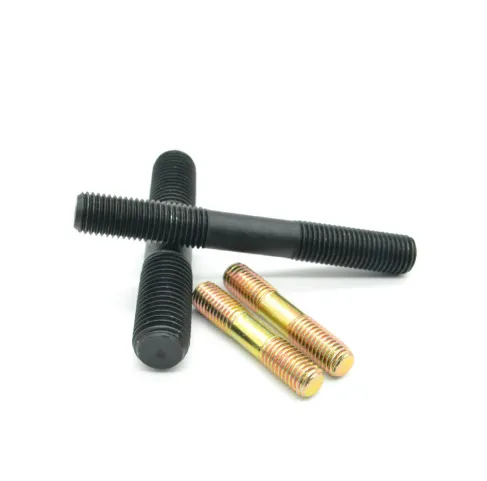Common Mistakes of Hex Bolts
மார்ச் . 07, 2025 14:12 மீண்டும் பட்டியலில்
Common Mistakes of Hex Bolts
Hex bolts are essential in construction, manufacturing, and various industrial applications. However, selecting the wrong type of bolt or using it incorrectly can lead to structural failures, equipment malfunctions, and increased costs. Understanding the common mistakes made when choosing galvanized hex bolts, zinc-plated hex bolts, grade 4.8 hex bolts, and grade 8.8 hex bolts can help prevent these issues and ensure long-lasting, secure connections. Let’s break down the most frequent errors and how to avoid them.

Overlooking Corrosion Protection: Galvanized Hex Bolts for Outdoor Applications
A common mistake is neglecting the need for corrosion-resistant bolts in outdoor or high-moisture environments. Many users opt for standard bolts when they should use galvanized hex bolts, which offer superior protection against rust and corrosion. Galvanized bolts undergo a hot-dip process that coats them with a thick zinc layer, providing a durable shield against the elements. When exposed to rain, humidity, or saltwater, galvanized hex bolts outperform untreated options, ensuring long-term reliability in outdoor infrastructure and construction projects.
Confusing Coatings: Zinc-Plated Hex Bolts vs. Galvanized Hex Bolts
Another frequent error is assuming zinc-plated hex bolts and galvanized hex bolts offer the same level of protection. While both feature a zinc coating, their performance differs significantly. Zinc-plated hex bolts are electroplated with a thin zinc layer, making them suitable for indoor or low-moisture environments. In contrast, galvanized hex bolts have a much thicker coating, ideal for outdoor and marine applications. Misusing zinc-plated hex bolts in outdoor settings can result in premature rust and compromised structural integrity.
Choosing the Wrong Strength: Grade 4.8 Hex Bolts for Heavy-Duty Tasks
Selecting bolts with inadequate tensile strength is a critical mistake in many industrial applications. Grade 4.8 hex bolts are commonly used for lightweight, non-structural connections due to their lower tensile strength. However, using grade 4.8 hex bolts in high-load or high-vibration scenarios can cause bolt deformation or failure. Always check load requirements and choose bolts with appropriate strength ratings for the task at hand. For heavier loads, higher-grade bolts are a safer and more reliable choice.
Underestimating High-Strength Requirements: Grade 8.8 Hex Bolts in Critical Applications
In contrast, some users underestimate the importance of high-strength fasteners when dealing with critical or load-bearing applications. Grade 8.8 hex bolts offer significantly higher tensile strength compared to lower-grade options, making them essential for heavy machinery, structural steel connections, and automotive components. Failing to use grade 8.8 hex bolts in these scenarios can lead to mechanical failure, safety hazards, and costly repairs. When strength is a priority, always opt for grade 8.8 hex bolts to ensure durability and performance.
Choose the Right Hex Bolts for Optimal Performance
Avoiding these common mistakes when selecting galvanized hex bolts, zinc-plated hex bolts, grade 4.8 hex bolts, or grade 8.8 hex bolts can save time, money, and potential safety risks. Ensure you understand your application’s requirements, select the correct coating for environmental conditions, and choose the appropriate grade for the load involved. For high-quality, reliable ஹெக்ஸ் போல்ட், visit our website and explore our extensive range of products designed to meet your project’s needs!
சமீபத்திய செய்திகள்
-
Bolts for Lawn Mower Handle Supplier | OEM & Rust-Resistant
செய்திNov.17,2025
-
Silver Screws Supplier | Corrosion-Resistant, Bulk & Custom
செய்திNov.17,2025
-
Cabinet Bolts Supplier | OEM, Bulk Stock, Fast Shipping
செய்திNov.17,2025
-
Axle Nuts Supplier - OEM-Grade, ISO-Certified, Fast Delivery
செய்திNov.17,2025
-
Wire Bolts Suppliers – OEM Factory Prices, ISO Quality
செய்திNov.11,2025
-
Bolts for Lawn Mower Handle Supplier – OEM & Anti‑Rust
செய்திNov.11,2025
